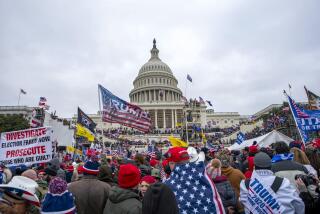Top court candidates differ on use of presidential power
Reporting from Washington — When President George W. Bush and his lawyers were insisting the commander in chief had the sole power to run the new “war on terror,” Judge Diane Wood sharply criticized that view.
Wood, now on President Obama’s list as a possible Supreme Court nominee, wrote in a 2003 Chicago law review article that “in a democracy, those responsible for national security must do more than say ‘trust us, we know best.’ ” Secret prisons and secret evidence do not comport with the rule of law, she said.
When the Bush administration argued that a Chinese Muslim could be held indefinitely as a Guantanamo Bay prisoner because he had gone to Afghanistan and may have “associated” with the Taliban, Judge Merrick Garland disagreed.
Garland, also on Obama’s short list for the Supreme Court, wrote two years ago for the U.S. Court of Appeals in Washington that “Lewis Carroll notwithstanding, the fact that the government has ‘said it thrice’ does not make the allegation true.” There was no evidence that the Uighurs were “enemy combatants,” he said.
But Elena Kagan, the third of the leading contenders for the Supreme Court seat, seems to have a broader view of the power of the presidency, based on her testimony last year when she was nominated as Obama’s solicitor general. During her Senate hearing, the Harvard Law School professor with no record as a judge, prosecutor or trial lawyer agreed with Sen. Lindsey Graham (R-S.C.) that the battlefield in the war on terrorism had no limits and that a suspected financier of terrorism arrested in the Philippines could be held indefinitely in military custody. “I think [that] makes sense, and I think you’re correct that that is the law,” Kagan said.
Since then, as the lawyer representing the Justice Department before the Supreme Court, she has successfully urged the court to steer away from legal claims brought by Guantanamo prisoners, including from several ex-prisoners who sued over alleged abuse and torture. “Torture is illegal under federal law and the United States government repudiates it. But the availability of claims for monetary damages against individual officials raises distinct questions,” she wrote in November.
The apparent contrast on the issue of executive power and the war on terrorism has attracted notice recently now that the three judges have surfaced as presumed finalists to replace Justice John Paul Stevens, the Supreme Court’s foremost champion of limits on presidential power. Presidents Clinton and George W. Bush felt the sting of Stevens’ opinions rejecting assertions of presidential power. In the series of Guantanamo cases, Stevens led a 5-4 majority that said these prisoners were protected by the Geneva Conventions and had a right to a hearing before a judge.
Kagan’s record makes some liberal legal experts uneasy over whether she is suited to succeed Stevens.
“She is a worrisome blank slate on these [executive power] issues. And what little we do know is not cause for comfort,” said Deborah Pearlstein, a Princeton University professor and a former clerk for Stevens who has written widely on legal issues involving terrorism. “A number of people have voiced concern that [Kagan] has a very broad view of executive authority.”
Kagan, 50, is unusual among recent Supreme Court contenders because she has a thin record of legal or judicial writings. Her one major academic work, a 140-page law review article called “Presidential Administration,” lauded the importance of the president’s active role in leading the agencies of government. It was based in part on her work as a young lawyer in the Clinton White House.
A native of Manhattan, she was a Supreme Court clerk to Justice Thurgood Marshall. She is best known for her role in bringing peace to the often acrimonious faculty at Harvard Law School. She hired prominent conservatives, including Jack Goldsmith, who had clashed with his superiors in the George W. Bush White House over national security issues. Kagan’s many champions include professor Charles Fried, the solicitor general for President Reagan.
Some lawyers close to the White House cite Kagan’s time at Harvard as evidence she could be a consensus builder at the Supreme Court. No doubt Obama could see an echo of his own experience as the president of the Harvard Law Review. It was his first major public accomplishment, and he won plaudits for bringing together conservatives and liberals.
But others say an experienced judge, such as Garland or Wood, would be more likely to have an impact within the high court.
Garland, 57, has a mixed record on national security cases. He was part of a 3-0 judicial panel that rejected an early appeal from Guantanamo detainees. Last year, he wrote a 39-page dissent when a conservative panel ruled that private contractors in Iraq were shielded from being sued for their alleged role in the torture and abuse of prisoners at Abu Ghraib.
Wood, 59, was an antitrust expert at the University of Chicago and a Justice Department lawyer when Clinton appointed her to the U.S. 7th Circuit Court of Appeals in 1995. Pearlstein said her fans included Justice Stevens. A Chicago native, the justice “always paid close attention to the work of the 7th Circuit. And the year I was there, Diane Wood’s name was one that always came up for praise,” she said.
More to Read
Get the L.A. Times Politics newsletter
Deeply reported insights into legislation, politics and policy from Sacramento, Washington and beyond. In your inbox three times per week.
You may occasionally receive promotional content from the Los Angeles Times.











